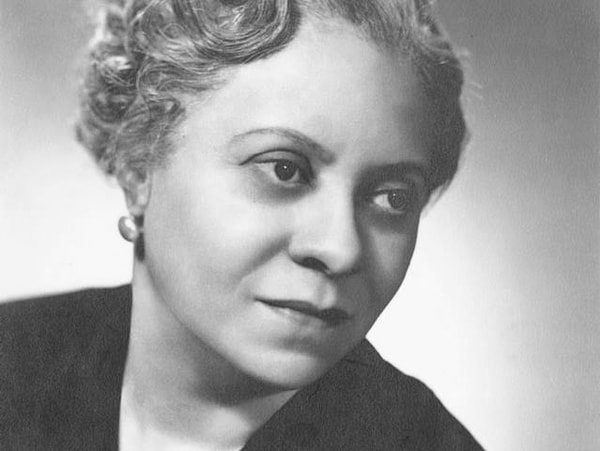 feature by Kelley Hollis note: this interview originally took place in February 2020, and The Daffodil Perspective has grown since then! To keep up to date, visit their website and follow them on social media! Welcome back to the BIBA Blog! COOS celebrates Black artistry by exposing audiences to works by exceptional Black composers. In a recent survey of 120 American orchestras ‘19-‘20 seasons, only 6% of the total works programmed were written by non-white composers and only 8% were written by female composers. After hearing her first live orchestral performance of a work by a female composer at the age of 30, Elizabeth de Brito began seeking out and exploring other female composers and discovered a wealth of works by a seemingly endless string of women. Today Elizabeth is the producer and founder of The Daffodil Perspective: the first ever bi-weekly gender-balanced classical music show, dedicating equal airtime to music written by male and female composers. None of the mainstage orchestras in the aforementioned survey achieved total gender parity in their season's programming, and a majority of them allocated less than 8% of their season’s music to works written by underrepresented composers, but de Brito believes there are enough exceptional classical works out there to craft programming that is more reflective of our society. BIBA: Tell me about your experience with classical music. EdB: I grew up in the UK and started studying piano and clarinet when I was little. I played through all the grades, was in lots of musicals, Junior Guildhall, lots of stuff like that. I enjoyed it but I kind of felt out of place and I stopped when I was 18. I just returned a couple years ago to classical music. BIBA: What was your inspiration for creating the first classical radio program with 50/50 gender parity? EdB: When I was at school, I heard nothing but statements of superiority about male composers and I never really questioned it. Then when I was in my 20’s I started questioning more, and I got really annoyed how it seemed like I only saw male artists, male songwriters, and male composers. Then a few years ago I attended the Women of the World annual showcase and they had an all female orchestra playing, and I heard my first ever female composer at the age of 30. It was Elisabeth Lutyens and her piece Overture En Voyage, and I was just completely blown away! I had no idea that any female composers existed, so I was simultaneously infuriated that there was all this great music out there that I didn’t know about, but also really excited about it! I went down this huge rabbit hole and discovered all these amazing composers. I thought, I have got to do something about this. So I decided: Let’s do a show! I had done community radio previously and it’s always been a passion of mine. I thought there had to be enough talented female composers out there to do a show, and sure enough every week I research a different composer for the segment Herstory: Rewritten and it just leads me to more. I’m programming male composers as well. I saw a couple of shows that had just female composers and I knew that that was not what I wanted to do. I knew I wanted to include them in context and kind of to be able to tell their stories in a more holistic way, so as to connect all the history. Making sure there was specifically gender balance, specifically a completely equal number of composers would be the best way to promote it and the best way to say this is really easy to do. We’re saying that you can have a balance all the time. BIBA: How do you think your identity has shaped your experience in music? How has it shaped the way you program music? EdB: It’s affected me a lot. I was a mixed race girl growing up in a kind of predominantly white, middle class, affluent, suburban England, and I was the only mixed race girl in my school playing classical music. And even when I attended music courses and when I was in the National Youth Wind Ensemble of Great Britain, which is quite prestigious, again I was the only mixed race person out of 200 and one of the only state school (public school) children as well. Most of the people I was meeting were private school-educated, privileged and wealthy, and I never felt like I belonged. I never felt like this was my world. I never felt like this was something I could do, which was one of the reasons why I stopped doing classical music. I experienced a lot of racism and sexism and snobbery. I was talking to a really wealthy older white lady a couple years ago and told her that I had felt uncomfortable throughout my school years because I was state school educated and my parents were really ordinary. I had no pocket money, no allowance. This white lady told me she couldn’t understand why I felt uncomfortable, and I think people who have a privilege don’t understand what it’s like for people outside of that privilege, and they don’t understand what it’s like to not be seen as well. I think that’s a really big thing because they see themselves everywhere in art and in the media. They don’t understand what it’s like to not be seen. That was a big thing for me. I want people to actually feel seen listening to my show. I want women to be inspired to think, “Wow, look! There are so many brilliant people, brilliant women in classical music. I could be a composer, or a conductor if I wanted”. And the same with BAME (Black and Minority Ethnic) individuals just like me. I want them to be able to see themselves in terms of programming music. I want it to be reflective of our society, not just a very specific narrow version, and I don’t want other people to grow up with that feeling of being uncomfortable because music is music and you shouldn't feel uncomfortable. BIBA: You said recently that each episode since the start has dedicated 8-16% of the music played to works written by Black and minority ethnic composers, but that going forward that amount would remain steadily at 16%. What made you decide that? EdB: My inclusion of BAME composers was a consideration when I started the show. I said I was going to program Florence Price from the beginning. But it wasn’t until halfway through that doing so had become really important to me. I am mixed race. There are so many brilliant composers that are marginalized as well. From June 2019 onward I started playing at least one composer on every show, but then I thought, this is tokenistic and I’m not happy with this. Yes it was still every show, which is way better than most programming anywhere, but for me it still felt it was more important for their voices to be heard and to make space for them. So the first reason I decided to play at least 2+ BAME composers per episode was because one felt tokenistic. The second reason I increased the amount is because I’m doing a gender balanced show and if I want to make this show reflective of society, and I’m in the UK where 15% of people are BAME, then if I played at least 2 composers a week, it would be at least representative of society. Sometimes I play more than two. This week (note: from an episode in February 2020) I played 4: Samuel Colleridge Taylor, Florence Price, William Grant Still and Hannah Kendall. Image in the Public Domain BIBA: Your most played composer on The Daffodil Perspective is none other than Florence Price. Castle of our Skins has performed several of her works over the years. What draws you most to her and her music? EdB: I really do love Florence Price. I’m a bit obsessed with her actually, but there is a reason. I think I’m drawn so strongly to her because I see myself in her music. She was mixed race like me, and her music is like that too. For me it’s like listening to my actual life experiences in musical form. She was the first female composer that I really identified with. Listening to her Symphony in E minor for the 1st time felt like I was finally whole. It was this genuine "lightning bolt" kind of feeling; like I was finally present in the world. I wrote a blog post for the International Florence Price Fest about how she inspired me, and one of the things that I said was growing up as a mixed raced person, you always feel like you have two sides and they’re all in dissonance. You’re surrounded by white people and you’re English, but then you’ve got another half of you, so it’s all really quite complicated. But I listen to her and it’s like I’m not in it. I’m whole. It’s like she’s saying to me, “I know you, I feel your pain. I know you’re strength and I know what you’re going through and what you’re capable of and everything that’s going on.” And apart from her music just being incredible, everything about her story is just amazing, and the more I find out about her, the more completely in awe of her I am. She was just so utterly amazing with the amount she had to overcome: the sexism, the racism, the Jim Crow laws, the abusive husband. You know she didn’t write her Symphony in E minor until she was 47? And then she just wrote a string of incredible stuff after that. Every time I listen to one more of her pieces, I just fall deeper in love. --- You can learn more about The Daffodil Perspective through their website: CLICK HERE! You can catch a performance of Florence Price's String Quartet in A minor by Castle of our Skins by CLICKING HERE!
1 Comment
|
Details
Writings, musings, photos, links, and videos about Black Artistry of ALL varieties!
Feel free to drop a comment or suggestion for posts! Archives
May 2024
|
Member Login
Black concert series and educational programs in Boston and beyond

 RSS Feed
RSS Feed










